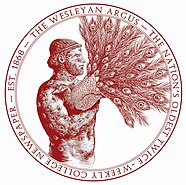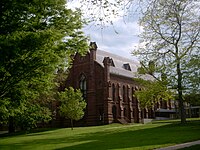The Wesleyan Argus
 The logo of The Wesleyan Argus | |
| Type | Student newspaper |
|---|---|
| School | Wesleyan University |
| Editor-in-chief | Caleb Henning ’25 Carolyn Neugarten ’26 |
| Managing editor | Phoebe Robinson ’25 |
| Founded | 1868 |
| Headquarters | 45 Broad Street Middletown, CT |
| Website | www.wesleyanargus.com |
The Wesleyan Argus is the student newspaper of Wesleyan University in Middletown, Connecticut, United States. Established in 1868, The Argus is the nation’s longest-running twice-weekly college newspaper, and is published every Tuesday and Friday throughout the school year. Each issue of The Argus includes the news, features, arts and culture, opinion, and sports sections, while Tuesday issues also include articles from the satirical Ampersand section.
History
The Argus was founded in 1868 and has been published bi-weekly since. The Argus does not run in exam periods and has paused publication during wartimes and the COVID-19 pandemic.[1]
The Argus is named after Argus Panoptes, a many-eyed giant in Greek mythology.[1]
In 1975, The Argus ran its first advertisement for a campus queer group.[2]
In 2015, The Argus made headlines after a student wrote an opinion piece questioning the tactics of members of the Black Lives Matter movement.[3] In response to student outrage, the President of the Wesleyan Student Assembly called for The Argus to be defunded.[3] However, school leaders defended the right of students to freely write in The Argus and funding was never cut.[3]
Notable alumni
- David Brancaccio, host of the public radio business program Marketplace Morning Report
- Ethan Bronner, senior editor at Bloomberg News
- Alan Miller, Pulitzer Prize-winning journalist
- Randall Pinkston, reporter for Al Jazeera America
- Stephen Talbot, documentary producer for Frontline
- John Yang, special correspondent for the PBS NewsHour
References
- ^ a b "About The Argus". The Wesleyan Argus. Retrieved 2022-04-28.
- ^ "Wesleyan history you'll definitely read here first". The Wesleyan Argus. Retrieved 2022-05-23.
- ^ a b c "Reporters flocked to a campus controversy but missed its surprising conclusion". Columbia Journalism Review. Retrieved 2022-05-22.
- v
- t
- e
buildings

- Douglas cannon
- Eclectic Society
- Mystical Seven
- Theta Nu Epsilon
- Xi Chapter, Psi Upsilon Fraternity
- Wesleyan Student Assembly
- The Wesleyan Argus
- Wesleyan University Press
- WESU










